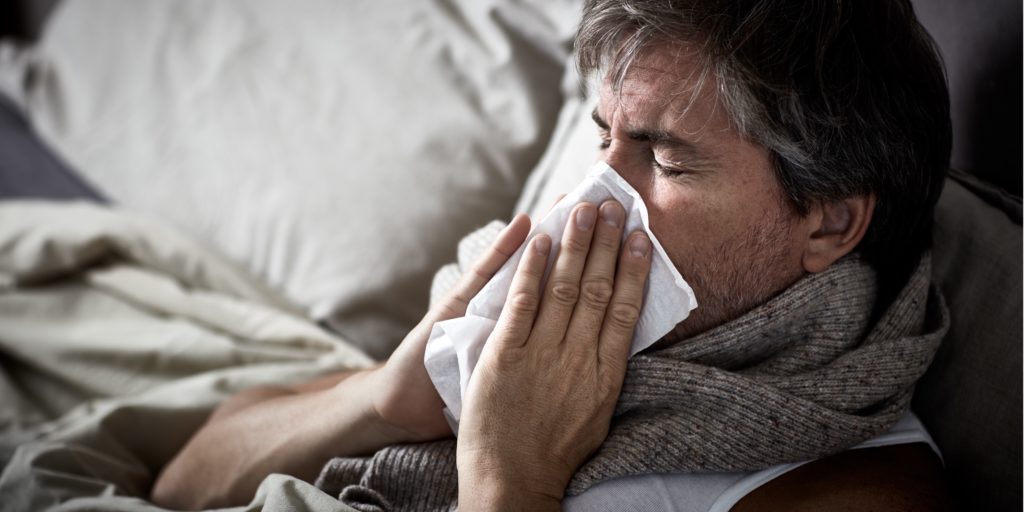Quick Hits
Daily brief research updates from the cognitive sciences

We all know that feeling when you’ve fallen sick, and you just want to curl up in your bed sheets and sleep the day away. You have little desire to move, and also probably aren’t hungry either.
You may not know, but can probably work it out, that this is actually good for you – it helps recovery. For example, in animals that are forced to eat when sick, mortality increases. So obviously the body is doing something that benefits us – even if it feels rubbish at the time.
But how this behaviour is controlled was a mystery: there could be multiple factors influencing this and multiple communication channels between body and brain. However, a group of researchers at Rockefeller University have now pinpointed a set of neurons that control this and the surprise is that it is only a small group of neurons that seem to influence this and not a distributed network. One small cluster that activates your sick behaviour.
This is in a region called the dorsal vagal complex, this sits at the base of the brain at the top of the spinal cord. And importantly it is before what is known as the blood-brain barrier. The blood-brain barrier is the brain’s protective wall that restricts what can get into the brain – the brain is a pretty important part of us so best to be safe. This means it receives input directly from the blood flowing through our bodies and can hence respond to this. The vagus nerve is the key parasympathetic pathway controlling multiple factors such as digestion, heart rate, and immune system function, and making this is an important crossroads for communication between the body and brain.
The team of researchers then activated this small population in neurons with mice who had been infected with dead bacteria to trigger an immune responses (but without getting sick). Activating or deactivating these cells increased sickly or reduced sickly behaviours.
So, there you have it, a small population of neurons slows you down when you’re sick – but, remember, it’s for your benefit.

Andy Habermacher
Andy is author of leading brains Review, Neuroleadership, and multiple other books. He has been intensively involved in writing and research into neuroleadership and is considered one of Europe’s leading experts. He is also a well-known public speaker, speaking on the brain and human behaviour.
Andy is also a masters athlete (middle distance running) and competes regularly at international competitions (and holds a few national records in his age category).
References
Anoj Ilanges, Rani Shiao, Jordan Shaked, Ji-Dung Luo, Xiaofei Yu, Jeffrey M. Friedman.
Brainstem ADCYAP1+ neurons control multiple aspects of sickness behaviour.
Nature, 2022; 609 (7928): 761
DOI: 10.1038/s41586-022-05161-7
More Quick Hits
Brain Scans Can Predict Your Political Affiliation
Quick HitsDaily brief research updates from the cognitive sciences rain scanning of political partisans is not new and it has long been reported that brain scans can predict political affiliation. But those studies were scans of political partisans...
Children with Same-Sex Parents Are Socially Well-Adjusted
Quick HitDaily brief research updates from the cognitive sciences his is not the first study to report that children of same-sex parents are well adjusted, there are plenty, but it is one of the first to be representative and hence gives some...
Simple Exposure to New Things Makes Your Brain Ready to Learn
ouldn’t it be great if we could learn things with no effort? Well, actually we often do, and children learn vast quantities of information, and knowledge with little to no effort – think of how well we learn languages which become fiendishly...
So, Can Cranberries Improve Memory?
tend to be hesitant to report on studies of single foods doing amazing things (because many do), but this piece of research still caught my eye. So, what did this group of researchers from the University of East Anglia find? Well, they...
The Real Problem with Social Media: It Induces Dissociative States
Quick HitsDaily brief research updates from the cognitive sciences ocial media seems to hijack our brains – or at least according to popular narratives. Most of us have experienced this where you get stuck in an endless stream of content,...
Adventurous Play Boosts Mental Resilience in Kids
o, a simple cheap way to help your kids improve all life skills and strengthen mental wellbeing. Too good to be true? Well, this piece of research, just out, finds a fascinating correlation with mental health and kids. This correlation was...






